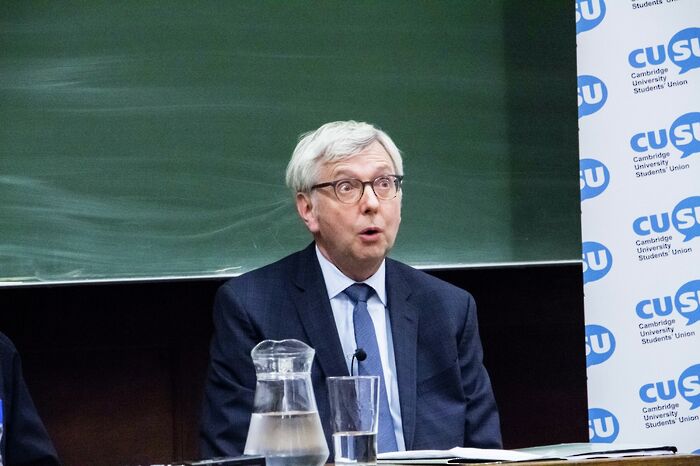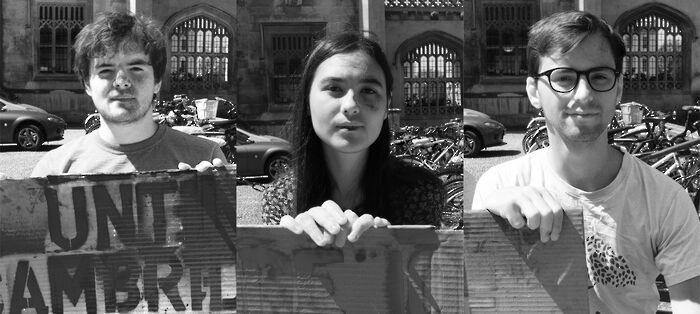Everything you need to know about the divestment debate
Monday’s crucial University Council decision follows a years-long divestment campaign

The University Council is set to make a historic decision on whether to commit to full divestment from fossil fuel industries on Monday, and campaign efforts have been escalating in preparation for what could be a crucial turning point in the years-long divestment debate.
Almost three years ago, in October 2015, the Cambridge Zero Carbon Society launched its divestment campaign, calling on the University to divest completely from fossil fuel industries. Since then, the University’s reluctance to commit to full divestment has provoked mass protest, even garnering national attention.
Universities across the country have been embroiled in ongoing divestment debates for several years, with some – including Durham, Edinburgh and Cardiff – having committed to complete divestment in recent months. Cambridge’s endowment – totalling £6.3 billion – is the largest of any university in the UK.
How much money does the University currently invest in fossil fuels?
At present, the University continues to hold some direct investments in fossil fuel industries, though it has consistently described these as “negligible”.
The University’s indirect investments came under scrutiny last November, following revelations of The Guardian’s Paradise Papers that Cambridge invested a total of £1.3m in Guernsey-based private equity firm Coller International, channelled principally towards oil and gas company Royal Dutch Shell.
Due to the opaque nature of many of the University’s indirect investments, it is difficult to determine exactly how much money funds fossil fuel industries, although some have used available data to approximate expected amounts. Environmental campaign group People and Planet estimate that the University’s investments in fossil fuel industries total £337 million, a figure often cited by student activists, though one which is very difficult to prove.
At an open meeting last term, Vice-chancellor Stephen Toope stressed the difficulties of transparency in the investment strategy, posing rhetorical questions to the audience – “how do we know that we’re investing in Shell?” – and explaining the complications arising from the use of ‘bundled investments’.
Although he acknowledged climate change as “the fundamental, crucial claim of our generation”, Toope has previously declared that he “can’t ensure that the University will divest”.
What have those within the University recommended?
In May 2015, the Advisory Committee on Benefactions and External and Legal Affairs (ACBELA) was established, tasked with evaluating “investment decisions” taken by the University, whose Statement of Investment Responsibility emphasises a “concern for sustainability and its relationship with the environment”.
The report compiled by the ACBELA working group, published in June 2016, recommended that investments in coal and tar sand be ‘blacklisted’, however, no such recommendation was made for investments in oil and gas companies, an omission decisively condemned by pro-divestment student activists at the time.
The report also recommended that the Statement of Investment Responsibility be altered, emphasising the importance of ensuring that the University’s investment management “reflects its underlying values” of environmental responsibility.
Last year, a pro-divestment grace, submitted by 140 members of Regent House, was passed through Regent House, the University’s governing body. It called for “none of the University’s Endowment Funds [to] be invested directly or indirectly in companies whose business is wholly or substantially concerned with the extraction of fossil fuels” and required the Council “to publish a report to the University within 12 months setting out how this is to be achieved.”
The Council responded that the Grace “cannot operate as a mandate in respect of the exercise of their fiduciary responsibility for the University’s investment practices”, but recognised “the strong feeling amongst those who have signed the Grace”, instead establishing a working group on divestment.
This working group, which has been meeting since early 2017, was tasked with examining the “advantages and disadvantages” of divestment. The terms of the working group’s creation specified that two student representatives sit on the board, positions which were filled by University Councillor, Umang Khandelwal, and Alice Guillaume, an undergraduate at Newnham College and member of Cambridge Zero Carbon Society.
At the beginning of March, Alice Guillaume resigned from the divestment working group after a leaked draft report recommended only partial divestment. Explaining her resignation, Guillaume argued that the draft report failed “to address the urgency of climate change and the injustices it engenders”.
Is there a consensus?
CUSU first passed a motion in favour of the University divesting its endowment in November 2015. The divestment campaign has since drawn considerable support from the student body, with large scale protest action, and petitions garnering thousands of signatures.
In April 2016, shortly before the release of the ACBELA working group’s report, Zero Carbon Society released a 74-page report entitled Fossil Fuel Divestment at the University of Cambridge. It was written by student activists, alongside a foreword by Rowan Williams, master of Magdalene College and former Archbishop of Canterbury. Williams is a long-time ally of the divestment movement, and has written in Varsity that the issue of climate change “is one that is seen increasingly clearly to be bound up with these basic matters of justice”.
Zero Carbon’s report described divestment as a “moral imperative”, claiming that it is “indefensible” for the University to invest in a manner which “actively propagates” the “global disaster” of climate change. Meanwhile, a petition calling for full divestment, created by the Zero Carbon Society, gathered more than 2,000 signatures.
In April this year, over 300 academics signed an open letter urging the University to fully divest from fossil fuels. This was supported by a student petition, which gathered over 1,100 signatures. An open letter, signed by 24 student representatives of the faculties and schools – including one student member from every Council of the Schools – was also issued to the University Council.
How have activists responded?
Zero Carbon has organised a variety of high profile, theatrical stunts over the past year. On Valentine’s Day, members of the pro-divestment group performed a mock wedding between Cambridge University and Shell outside a meeting of the University’s Finance and Business Committee, and earlier that same month protesters staged a crime scene outside the University Investment Office, calling for greater transparency regarding investments. The group also dropped a banner demanding that ‘Oxbridge divest’ at the annual boat race between Oxford and Cambridge.
Promising “large-scale disruption” in response to the ‘sham’ draft report, Zero Carbon began escalating protest action, with a series of demonstrations culminating in their largest rally to date, attended by over 300 people, calling for ‘Corporation Cambridge’ to divest.
In April, a group of 15 pro-divestment student activists barred staff from entering the University’s finance office, Greenwich House, protesting the “business as usual” attitude of the University in response to what they describe as a climate “crisis”. On Friday evening, this building was again occupied by Zero Carbon Society, who vowed to remain there until the University agrees to full divestment from fossil fuels.
Exactly a week before the decision is set to take place, Zero Carbon activists spray painted messages and symbols onto the walls of Old Schools. Now washed away, flowers, hearts and pro-divestment slogans were painted in bright hues by a group of around 30 students.
Since Wednesday, three first year students have been on hunger strike until the University commits to “full divestment from fossil fuels by the year 2022”, in both their direct and indirect investments.
As Council members gather at Senate House to make a decision of whether to commit now to fully divest on Monday morning, students will rally outside the building.
What next?
The leaked draft report from the working group recommended that the University adopted “a position of partial divestment” and “a positive investment strategy”. While it suggested that the University commit “not to invest in the most polluting products of tar sands and thermal coal”, it recommended only divesting from any current holdings over which the University has direct control, and to place 10% of Cambridge’s endowment explicitly in Environmental Social and Governance (ESG) funds. However, following the leak, a University spokesperson told Varsity that the leaked report was not in fact the most recent version.
ACBELA’s 2016 report on investment responsibility recommended that the University blacklist investments in coal and tar sands, therefore the leaked report offers nothing new on this particular front. After two more years of high-profile campaigning, a proposal offering little beyond previous suggestions is sure to prove unpopular amongst the student body.
In fact, given the large scale of decisive support for the divestment movement among activist groups, it seems likely that any decision other than complete divestment will be met by widespread outcry and further protest.
Zero Carbon said that the leaked report was “totally insufficient”, adding that the University management should “think twice about [their] decision, and listen to staff and students”. The group pledged to continue campaigning until the University divests, “whether in this Council meeting or the next”.
 News / Uni Scout and Guide Club affirms trans inclusion 12 December 2025
News / Uni Scout and Guide Club affirms trans inclusion 12 December 2025 News / Pembroke to convert listed office building into accom9 December 2025
News / Pembroke to convert listed office building into accom9 December 2025 Features / Searching for community in queer Cambridge10 December 2025
Features / Searching for community in queer Cambridge10 December 2025 News / Uni redundancy consultation ‘falls short of legal duties’, unions say6 December 2025
News / Uni redundancy consultation ‘falls short of legal duties’, unions say6 December 2025 News / Gov declares £31m bus investment for Cambridge8 December 2025
News / Gov declares £31m bus investment for Cambridge8 December 2025












